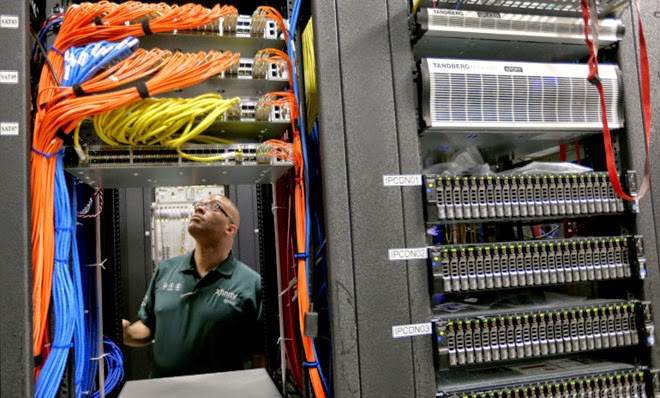Streaming Internet Should Flow like water: FCC “Internet a Utility Now”
After almost a year of fierce national debate, the Federal Communications Commission voted Thursday to pass net neutrality in a 3-to-2 partisan vote. The five-member commission “reclassified” broadband Internet access as a “common carrier” under Title II of the Telecommunications Act, making the Internet a regulated utility like water or electricity.
The new rules aim to ensure that Internet service providers (ISPs) cannot discriminate between content-makers by blocking or deliberately slowing some content while offering prioritization for those willing or able to pay. Mobile data service for smartphones and tablets also are being placed under the new rules. The directive also includes requirements to protect consumer privacy and to ensure Internet service is available for people with disabilities and in remote areas.
Critics of the rules say they may hinder innovation and investment. Opponents have said they plan to challenge the FCC order in court. But Republicans on Capitol Hill announced Tuesday that they do not plan to pass a legislative response.
Net neutrality, or an open Internet, is the concept that ISPs should give consumers equal access to all legal content and applications. That means ISPs could not favor or block some content-makers or charge them to provide faster delivery of their content, in what are known as “fast lanes.” ISPs would also be forbidden from slowing the content of competing providers.Supporters of net neutrality say the Internet has become a human right that should be equally accessible for everyone. Denying access or giving preferential treatment to one user over another is thus considered a violation of the user’s rights.
"The Internet, which was once a luxury, is now a necessity, and it has given people the ability to be heard in our democracy and have more opportunity in our economy," Rashad Robinson, executive director of ColorOfChange, an online civil rights organization, was quoted as saying in USA Today. "It has been a tool for the little guy to get ahead."
Proponents of net neutrality say that without the new rules, smaller content providers unable to pay hefty fees to ISPs would be pushed out and made more difficult to access.
“No one should have to ask permission to innovate, and we need to retain the ability of all Internet users to communicate and compete on a level playing field, preventing the presence of fast and slow lanes that are contrary to the essence of the Internet,” Sen. Edward J. Markey (D) of Massachusetts said in a statement.
Many larger Internet companies such as Netflix and Amazon, both of whose streaming services use large amounts of bandwidth, support the idea of net neutrality. Google and Twitter also are supporters.
"More than 30 percent of Internet traffic at peak times comes from Netflix, according to studies. So Verizon might say, 'Netflix, you need to pay us more,' " NPR’s Laura Sydell explains. "Or maybe Verizon strikes a deal with Amazon and says your prime video service can get speedier delivery to the home and we're going to slow down Netflix.”
If companies are asked to pay more, consumers may be asked to foot the bill, observers say.
But those who oppose net neutrality say it is an issue of free enterprise: Service providers should be free to decide how they deliver content and charge customers for their services. They also claim that net neutrality will prevent ISPs from making network upgrades and finding new business models.
“The last thing we should want is President Obama or a government agency picking winners and losers on the Internet. And enforcing net neutrality is picking winners and losers even if it looks like it is just ‘leveling the playing field.' He may think it is not, but it completely blocks certain business models and stops any possible innovation that might emerge if given the option of seeking differential access to bandwidth,” writes Jeffrey Dorfmanin Forbes.
“ 'Net Neutrality' is Obamacare for the Internet; the Internet should not operate at the speed of the government,” wrote Republican Sen. Ted Cruz in a tweet last November.
Furthermore, more than just the Internet is at stake, some say.
“Advocates for pay-TV providers are saying the FCC should use Section 706 to act more aggressively against the companies that produce TV content. Why? Because the pay-TV providers think the content producers are charging them too much for programming – and because programming costs eat into the budget for building, say, cable broadband,” writes Brian Fung in The Washington Post.
If the FCC decides to pursue this line of logic, it could affect how much consumers pay for cable providers, too.
 What every side does agree on, though, is that the results of today’s vote will affect everyone who uses the Internet. Anyone who goes online does so through an ISP, and increasingly these companies are lobbying to provide services on their own terms. Without net neutrality rules, companies like Comcast and Verizon could cherry pick which content is easy to access. And that means that consumer access to specific online content could slow down or speed up noticeably.
What every side does agree on, though, is that the results of today’s vote will affect everyone who uses the Internet. Anyone who goes online does so through an ISP, and increasingly these companies are lobbying to provide services on their own terms. Without net neutrality rules, companies like Comcast and Verizon could cherry pick which content is easy to access. And that means that consumer access to specific online content could slow down or speed up noticeably.
For anyone who uses the Internet, around 87 percent of Americans, today’s vote is a really big deal.


Comments